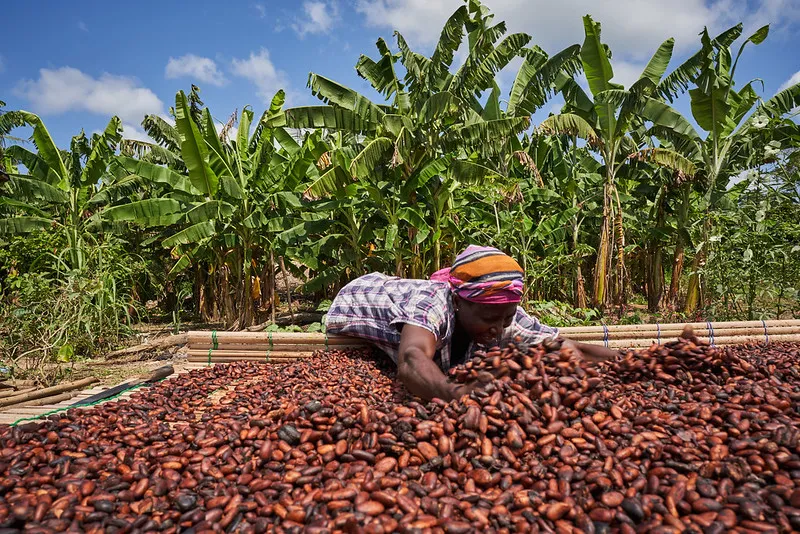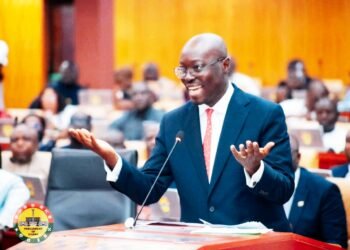The economic relationship between the United States and Ghana is facing fresh scrutiny following a controversial 10% tariff imposed by U.S. President Donald Trump’s administration.
Dr. Theo Acheampong, an economist and political risk analyst, has weighed in on the implications of these trade measures, cautioning that they could have significant consequences for Ghana’s economy.
According to Dr. Acheampong, the total trade volume between the U.S. and Ghana stood at $2.1 billion in 2024, with $967 million worth of goods exported to Ghana and $1.2 billion in imports from Ghana.
While these figures indicate robust engagement, they also reflect a decline from 2023 levels, with a resulting trade deficit of $204 million.
“Exports from Ghana to the United States (2023) were primarily crude petroleum (71%), cocoa beans, and cocoa paste (13%). Imports comprised largely cars (25%) and refined and crude petroleum (23%).”
Dr. Theo Acheampong
Accordingly, he noted that these trade dynamics indicate a heavy reliance on commodity exports, particularly in the oil and cocoa sectors.

With the new tariff policies, Dr. Acheampong expressed concern about their potential impact on specific Ghanaian exports.
“Tariffs may likely affect cocoa products, including beans. However, given the complex value chain dynamics around how they are traded, I don’t see this significantly affecting petroleum products.”
Dr. Theo Acheampong
This suggests that while Ghana’s oil sector may be spared from major disruptions, its cocoa industry could face serious hurdles.
Ghana Not To Retaliate
A critical question raised in response to the U.S. tariff hike is whether Ghana should impose countermeasures by applying or increasing tariffs on U.S. imports.
Dr. Acheampong’s answer is a resounding “probably not!” He argued that such a move could backfire on Ghana’s already fragile economy.
“The cost-pass-through will mostly be felt by Ghanaian consumers, increasing already high inflationary pressures that the central bank is struggling to control.”
Dr. Theo Acheampong

Given that Ghana has been grappling with persistent inflation, the economist argued that adding more tariffs could exacerbate the situation and lead to further price hikes for essential goods.
He further indicated that the trade relationship between Ghana and the U.S. accounts for roughly 6% of Ghana’s total foreign trade on the import side.
However, Dr. Acheampong pointed out that Ghana’s trade ties with China are far more significant. “China-Ghana trade is 13% and 18% on the export and import side, respectively.”
According to him, this indicates that while U.S. policies may have an impact, China’s role in Ghana’s economy is even more substantial.
Despite this, Ghana cannot afford to ignore the ripple effects of U.S. trade policies.
He noted that even if Ghana’s direct trade with the U.S. is relatively small, there could be second-round inflationary effects that would spread through the global economy.
“Ghana will feel the second round of inflationary cost pass-through, not because of imports and exports with the U.S. but in other countries like China and others, whose input costs may rise and will be felt by all economies, including Ghana.”
Dr. Theo Acheampong
This highlights the interconnected nature of the global economy, where policy shifts in one major economy can trigger inflationary pressures in multiple regions.
A Larger Economic Picture
While tariffs are a significant issue, they are just one piece of a larger economic puzzle. Ghana continues to face external headwinds, including fluctuating global commodity prices, exchange rate volatility, and the broader economic slowdown affecting many developing economies.
The country’s reliance on exports such as crude oil and cocoa makes it particularly vulnerable to shifts in international trade policies.

Given this reality, experts like Dr. Acheampong suggest that Ghana should focus on strengthening its economic resilience rather than engaging in retaliatory trade measures.
A diversified economy, improved industrial capacity, and a more strategic trade policy could help mitigate some of the risks posed by external shocks.
The ongoing trade tensions between the U.S. and its global partners present both challenges and opportunities for Ghana.
While tariffs may pose risks to certain sectors, they also create room for Ghana to explore alternative trade partnerships, particularly within Africa and with emerging markets in Asia and the Middle East.
Ultimately, how Ghana navigates these economic uncertainties will depend on its ability to balance trade policy, inflation control, and long-term economic growth strategies.
As the world continues to grapple with shifting trade alliances and protectionist policies, Ghana must position itself wisely to remain competitive on the global stage.























